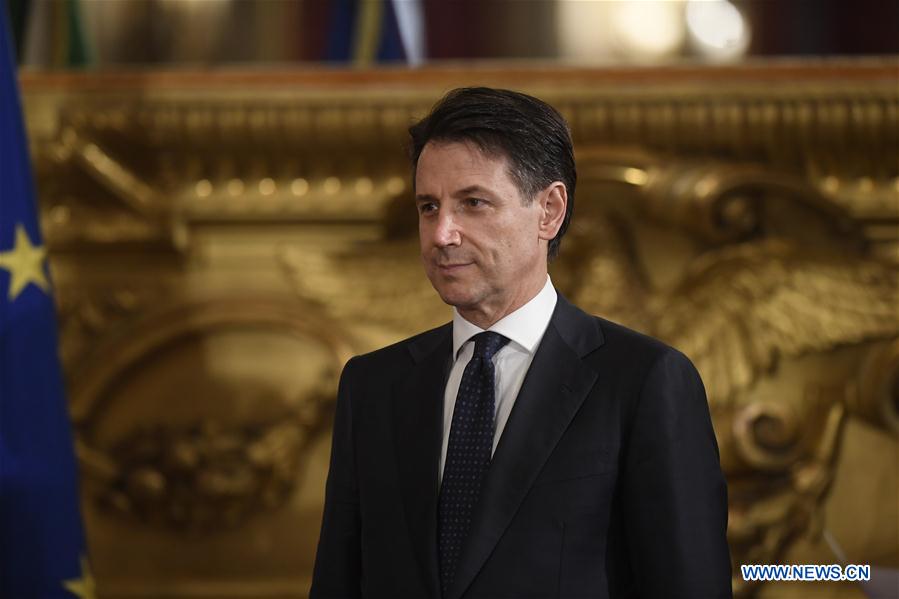Italy and the misreading of history
- By Sumantra Maitra
 0 Comment(s)
0 Comment(s) Print
Print E-mail China.org.cn, June 4, 2018
E-mail China.org.cn, June 4, 2018

Hans Morgenthau, in writing about the post WWII, said, that public opinion is in some ways incompatible with diplomacy and politics. Firstly, he said, elections and public opinions have considerable constraints on the speedy disposal of issues, which a more authoritative and centralized process won't face. Second, the public can be easily manipulated as people are emotional.
Both those arguments are now currently flying around in Italy as both sides accuse each other of a massive betrayal as the EU prepares for a crisis that it has not faced in decades and that might make the Greece crisis and even Brexit look smooth and orderly by comparison.
The Italian President Sergio Mattarella initially said he could not appoint Paolo Savona, the name put forward by the winning parties, and invited Carlo Cottarelli of the International Monetary Fund, to form a government, which was almost certain not to be able to continue and win a vote of confidence in parliament. Next, he went back and invited the parliamentary candidate put forward by the two parties. Savona is still in the cabinet, in a different post. But the damage was already done to the reputation.
This entire episode has Italians questioning why even have elections when the decision of the majority of the people will be changed for the status quo by a non-elected president and the external banking sector and industries. The current joke going on in Italy now is that even a monarchy and feudalism was better than this. At least the leaders dressed better.
This is an enormous political gamble, which did not go down well for the left and will definitely empower the right. The majority of the people in Italy is now skeptical of the EU, and that's putting it mildly. They feel betrayed by the European nations up north, who invited migrants, but did nothing to share the burden. They are fed up with endless lines of austerity and the chronic underperformance of the economy and unemployment of the Italian electorate.
The braying liberal German and French media, politicians and bureaucrats from Brussels are adding to the siege mentality felt in Italy. Italians frankly now consider their government to be betrayed and controlled by elites. Which, despite being a simplistic view, is not entirely false, as all they can see is their government and laws being controlled by people who are not Italians. It's a feeling of abject colonization, a word, which is extremely common in Italian social media circles these days.
The election of a populist government didn't just happen in a vacuum. Italians, just like the Greeks and the British, want to exit the Eurozone, and they shouldn't even be there, as their economy has stagnating for over ten years. But the major mistake on the part of Brussels was to frame the entire argument on the basis of the economy.
The market decides who stays in the EU, and how they are run, and if the country doesn't agree, well, no choice. That worked with Greece, but Italy is ten times bigger. The more the EU wants to change the reality, the more it looks like an empire forcing its will on hapless commoners. As the leftist economist and former Greek finance minister Yanis Varoufakis said in the Guardian, the only way the Italy issue could have been resolved was to have the Italian parties form a government and fail.
Instead, the EU paved the way for a bigger backlash. It is a battle against time, as one cannot simply force an entire population to stay in a union which they don't want to be a part of and which is, for good or for bad, making their lives miserable.
It could be avoided. If in a new election the standard centrist technocratic Italian government comes into force, then the entire confrontation would be avoided. As of now, the Italian political scenario is heading towards long term instability anyway.
The risks are vast. Both left and right-wing parties have said in the eventuality of a fresh election, they would run with one single platform -- getting out of the eurozone. "It won't be an election," Matteo Salvini was quoted in the Wall Street Journal, saying that a new election would essentially look like a referendum, determining whether Italy is ruled by foreign forces.
If that threat comes true, and if Italians vote against the single currency, it would wreck the EU as a single political entity. Ultimately, it will prove that one can have idealistic aspirations, but the reality of having different countries bound together is utopian. Not reading history is wrong, but misreading history can be fatal.
Sumantra Maitra is a columnist with China.org.cn. For more information please visit:
http://www.formacion-profesional-a-distancia.com/opinion/SumantraMaitra.htm
Opinion articles reflect the views of their authors only, not necessarily those of China.org.cn.





